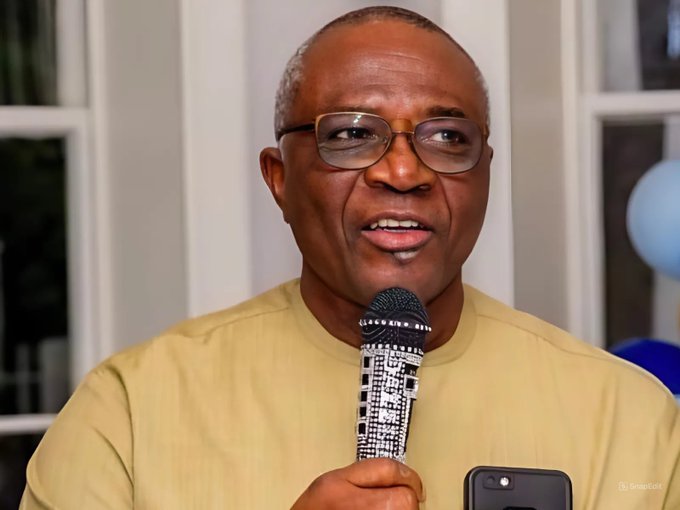In a dramatic turn of events, the Nigerian Presidency has moved to clear the air over the recent appearance of former President Muhammadu Buhari in an arbitration court in Paris, denying claims that the former leader was “forced” to testify. The highly sensitive testimony is related to the ongoing $6 billion Mambilla power project dispute, which has been a source of contention for over two decades.
Reports that Buhari was summoned under duress to testify before the International Chamber of Commerce (ICC) Court of Arbitration have sparked a wave of controversy, leading to a swift and strong rebuttal from the Presidency. The Presidency has described the claims as “fake news,” accusing certain media outlets of misrepresenting the facts surrounding the case. According to the official statement issued by the Special Adviser on Information and Strategy, Bayo Onanuga, the allegation that Buhari was coerced into participating in the arbitration proceeding was entirely false.
The Controversy Unfolds
The media storm surrounding Buhari’s testimony began when an online news platform reported on Saturday that the former President had been “hauled before the court” in Paris to answer questions related to the Mambilla power project, which was initially awarded to Sunrise Power and Transmission Company by the administration of former President Olusegun Obasanjo in 2003.
The arbitration concerns the failure to deliver on the power project, one of Nigeria’s most ambitious power generation initiatives, which has been marred by multiple delays, legal battles, and accusations of mismanagement. The dispute has led to a series of legal proceedings, including the current arbitration case in Paris, which involves high-profile Nigerian figures defending the country’s interests.
However, the media report claimed that Buhari was summoned without prior warning and “grilled for hours,” suggesting a forced testimony. The report further stated that President Bola Tinubu had approved the decision to push his predecessor into the international court proceedings.
Presidency Responds to ‘Fake News’ Claims
In response, Onanuga vehemently denied these claims, asserting that no Nigerian official, including Buhari, was compelled to participate in the arbitration process. The Presidency’s statement categorically dismissed the notion that Buhari had been “hauled” before the court, affirming that all individuals testifying on behalf of Nigeria were doing so voluntarily.
“While respecting the confidentiality of the proceeding, we wish to state categorically that President Bola Tinubu has not forced anyone to testify for or against Nigeria,” Onanuga said in the statement. “All the eminent Nigerians involved in Nigeria’s defence are doing so willingly and out of sheer patriotism and conviction. President Tinubu and the entire country are grateful to them.”
The statement went on to emphasize the confidential nature of the arbitration process and reminded the public that reports from private proceedings were speculative and unverified until an official decision was reached by the arbitrators.
Background of the Mambilla Power Dispute
The Mambilla Power Plant, located in Nigeria’s Taraba State, was conceived in the 1980s as a means to address the country’s energy crisis. The project, however, has faced numerous setbacks over the years, including political interference, financing challenges, and legal disputes.
In 2003, the government awarded the contract to Sunrise Power and Transmission Company, a Nigerian firm. However, disagreements over contract terms and project delays led to multiple legal challenges. In 2017, the arbitration process was initiated, with Sunrise Power seeking compensation for damages arising from the failure to meet project milestones. This has evolved into a complex legal battle, with both Nigerian officials and private parties involved in defending the country’s position.
The case has drawn significant attention due to its high stakes, not just for Nigeria’s energy sector, but also for the broader political landscape. The involvement of high-ranking officials such as Buhari and other prominent Nigerians has led to increasing speculation about the political and diplomatic ramifications of the case.
Despite the Presidency’s emphatic denial of any coercion, the question remains whether individuals involved in the case are testifying out of patriotism or under some form of political pressure. Some critics have raised concerns over the timing of the arbitration proceedings, especially given the political context in which they are taking place.
The Legal and Political Implications
The legal ramifications of the Mambilla power dispute are still unfolding. A ruling in favor of Sunrise Power could result in a significant financial burden on Nigeria, further straining an already fragile economy. Conversely, a victory for the Nigerian government could strengthen its position on future international arbitration cases.
Politically, the involvement of former President Buhari in the case is seen as a delicate balancing act. His testimony could either solidify or damage his legacy, depending on the outcome of the proceedings. The broader political implications for President Tinubu’s administration are also at stake, as any controversy surrounding the case could be perceived as a reflection of the government’s handling of critical national issues.

